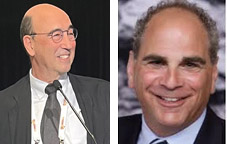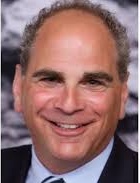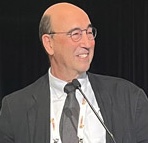Local News
Accolades for internationally-renowned medical researchers

By MYRON LOVE Internationally known heart researcher Dr. Lorrie Kirshenbaum has a new accolade to add to his resume in recognition of his ground-breaking research over the past 30 years and more.

Most recently, Kirshenbaum – the long time Director of the St. Boniface Hospital’s Institute of Cardiovascular Sciences and Professor in the University of Manitoba’s Department of Physiology and Pathophysiology and Pharmacology and Therapeutics – was awarded an Honorary Doctorate in Science degree from the University of Kragujevac in Serbia. Previously, he had bestowed upon him the Heart and Stroke Foundation of Manitoba R.E. Beamish Memorial Award (in 2014), the University of Manitoba’s Distinguished Alumni Professional Achievement Award (2018,) and the Canadian Cardiovascular Society, Research Achievement Award in 2020. Last year, he was inducted into the Order of Manitoba.
He has also been recognized by several international heart research organizations in recent years.
On the late afternoon of Friday, May 3, colleagues, family and friends gathered in the atrium of the Albrechtsen Research Centre at the St. Boniface Hospital complex to celebrate Kirshenbaum’s newest honour.
Several colleagues stepped up to the podium to praise the honoree, among them Dr. Arnold Naimark, Past President of the University of Manitoba. Naimark began his remarks by quoting Winston Churchill’s adage that “no burden is heavier than great potential.”
“I remember Lorrie as a young scientist at the University of Manitoba,’ Naimark commented. “He was always asking questions.
“Not only is he a dedicated researcher, but also he contributes to the scientific community. Many of his students have become leaders in their own right.”
Among others praising Kirshenbaum were: Dr. Ian Dixon, head of the department of physiology and pathophysiology; the Honourable Dr. Rene Cable, Minister of Advanced Education – representing the provincial government; Dr. Jude Uzonna, Vice Dean of Research, Rady Faculty of Health Sciences, University of Manitoba; and Dr. Bram Ramjiawan, Director of Research, Asper Clinical Research Institute, speaking on behalf of Dr. Michael Czubryt, Executive Director of Research. Albrechtsen Research Centre.
“You do what you do, not in the hope of recognition, but because you want to make a difference,” Kirshenbaum noted when it was his turn at the podium. I love doing research and I love teaching.”
He expressed his gratitude to his wife, Dr. Diane Popeski, and his family, as well as the members of his research team. “I have a group of superb researchers who have been with me for a long time. They have done all the heavy lifting.”
He also spoke of the many students that he has taught over the past 30 years. “I am inspired by younger people,” Kirhenbaum said.
He completed his remarks by referring to those who came before him – mentors in cardiology such as Dr. Naranjan Dhalla, founding director of the Institute of Cardiovascular Sciences at the St. Boniface Hospital, and the late Dr. Robert Beamish, the founding director of the Manitoba Heart Foundation.
“I stand on the shoulders of giants,” Kirshenbaum said.
A graduate of the University of Manitoba – with a Ph.D. in Physiology – the son of Mildred and the late Alec Kirshenbaum says that he knew from a very young age that he wanted to devote his life to science and research.
Over the past few years, he and his team of four researchers and 20 workers have been focusing on three specific areas of research into heart health and heart disease. One of those focuses has been a study of the relationship between certain chemotherapy drugs and heart failure. A second area of interest for Kirshenbaum and his researchers has been the effect of night work on the heart and general health of shift workers.
His most recent efforts have been focused on developing a women’s heart research program at the St. Boniface Hospital. Kirshenbaum pointed out in an earlier interview that women suffering from heart disease exhibit different symptoms than men. As a result, heart disease is often undiagnosed in women and undertreated.
“As part of this program, we are trying to recruit a specialist in this area for the St. Boniface Hospital and encourage students at our medical school to consider specializing in this field of medicine,” he noted. “We are striving to develop this dedicated women’s heart health research program with a goal of reducing heart disease and improving quality of life.”

Top liver specialist Dr. Gerald Minuk awarded gold medal by Canadian Association for the Study of the Liver
Dr. Gerald (Yossl) Minuk, Canada’s first liver specialist, and founder of the section of hepatology in the Department of Internal Medicine at the Health Sciences Centre was awarded the Gold Medal by the Canadian Association for the Study of the Liver (CASL) – which he co-founded 22 years ago – at its annual meeting, which was held in Toronto on March 1.
Minuk says that he was overwhelmed by the honour. “I am in very impressive company,” he notes. “Four of the previous Gold Medal recipients were also Nobel Prize winners.”
The son of the late Max and Edith Minuk has had a long and colourful career – a career that has taken him all over the world. Early on, he did locums in Churchill and in St. John’s, Newfoundland. He studied hepatology at the National Institutes of Health in Bethesda, Maryland. In July, 1982, Canada’s first liver specialist was recruited by Foothills Hospital in Calgary. He returned to Winnipeg in 1987 to found the hepatology section here.
I have written previous stories about Yossl describing a two-week stay teaching in China about 35 years ago – and a later invitation to share his expertise in the oil-rich Arab Kingdom of Qatar where the authorities want ed to hire him despite his being an openly Orthodox Jew.
His 42-year career has encompassed clinical research, ministering to patients, publishing more than 300 research papers, and teaching. He notes that, over the years, he has taught up to 200 students – many of whom have gone forward to start their own liver programs across Canada.
Although Minuk retired two years ago, he continues to work on what was his final research project – a $2.1 million, five-year study to try to determine why Indigenous Canadians suffer from liver disease at a much higher rate than the overall Canadian population.
Anyone who knows Yossl also knows that his principal passion beyond his career has been the House of Ashkenazie, the last of the old North End shuls. He has been a mainstay of the old shul for decades – often recruiting medical colleagues and students to join him at shul for morning minyans. In recent times, morning minyans at the Ashkenazie have declined to Thursday mornings only – but Yossl Minuk hopes to keep the old building going by turning it into a museum – for which he is still seeking funding.
In the meantime, he continues to attend twice daily minyans at the Lubavitch Centre.
Local News
Winnipeg Jewish Theatre breaks new ground with co-production with Rainbow Stage

By MYRON LOVE Winnipeg Jewish Theatre is breaking new ground with its first ever co-production with Rainbow Stage. The new partnership’s presentation of “Fiddler on the Roof” is scheduled to hit the stage at our city’s famed summer musical theatre venue in September 2026.
“We have collaborated with other theatre companies in joint productions before,” notes Dan Petrenko, the WJT’s artistic and managing director – citing previous partnerships with the Segal Centre for the Performing Arts in Montreal, the Harold Green Jewish Theatre in Toronto, Persephone Theatre in Saskatoon and Winnipeg’s own Dry Cold Productions. “Because of the times we’re living through, and particularly the growing antisemitism in our communities and across the country, I felt there is a need to tell a story that celebrates Jewish culture on the largest stage in the city – to reach as many people as possible.”
Last year, WJT approached Rainbow Stage with a proposal for the co-presentation of “Fiddler on the Roof.” Rainbow Stage management was really enthusiastic in their response, Petrenko reports.
“We are excited to be working with Winnipeg’s largest musical theatre company,” he notes. “Rainbow Stage has an audience of more than 10,000 people every season. Fiddler is a great, family-oriented story and, through our joint effort with Rainbow Stage, WJT will be able to reach out to new and younger audiences.”
“We are also working to welcome more diverse audiences from other communities, as well as newcomers – families who have moved here from Israel, Argentina and countries of the former Soviet Union.”
Helping Petrenko to achieve those goals are two relatively new and younger additions to WJT’s management team. Both Company Manager Etel Shevelev, and Head of Marketing Julia Kroft are in their 20s – as is Petrenko himself.
Kroft, who is also Gray Academy’s Associate Director of Advancement and Alumni Relations, needs little or no introduction to many readers. In addition to her work for Gray Academy and WJT, the daughter of David and Ellen Kroft has been building a second career as a singer and actor. Over the past few years, she has performed by herself or as part of a musical ensemble at Jewish community events, as well as in various professional theatre productions in the city.
Etel Shevelev is also engaged in a dual career. In addition to working full time at WJT, she is also a Fine Arts student (majoring in graphic design) at the University of Manitoba. Outside of school, she is an interdisciplinary visual artist (exhibiting her work and running workshops), so you can say the art world is no stranger to her.
(She will be partcipating in Limmud next month as a member of the Rimon Art Collective.)
Shevelev grew up in Kfar Saba (northeast of Tel Aviv). She reports that in Israel she was involved in theatre from a young age. “In 2019, I graduated from a youth theatre school, which I attended for 11 years.” In a sense, her work for WJT brings her full circle.
She arrived in Winnipeg just six years ago with her parents. “I was 19 at the time,” she says.
After just a year in Winnipeg, her family decided to relocate to Ottawa, while she chose to stay here. “I was already enrolled in university, had a long-term partner, and a job,” she explains. “I felt that I was putting down roots in Winnipeg.”
Etel expects to graduate by the end of the academic year, allowing her to focus on the arts professionally full-time.
In her role as company manager, Shevelev notes, she is responsible for communications with donors, contractors, and unions, as well as applying for various grants and funding opportunities.
In addition, her linguistic skills were put to use last spring for WJT’s production of “The Band’s Visit,” a story about an Egyptian band that was invited to perform at a cultural centre opening ceremony in the lively centre of Israel, but ended up in the wrong place – a tiny, communal town in southern Israel. Shevelev was called on to help some of the performers with the pronunciation of Hebrew words and with developing a Hebrew accent.
“I love working for WJT,” she enthuses. “Every day is different.”
Shevelev and Petrenko are also enthusiastic about WJT’s next production – coming up in April: “Ride: The Musical” debuted in London’s West End three years ago, and then went on to play at San Diego’s Old Globe theatre to rave reviews. The WJT production will be the Canadian premiere!
The play, Petrenko says, is based on the true story of Annie Londonderry, a young woman – originally from Latvia, who, in 1894, beat all odds and became the first woman to circle the world on a bicycle.
Petrenko is also happy to announce that the director and choreographer for the production will be Lisa Stevens – an Emmy Award nominee and Olivier Award winner. (The Olivier is presented annually by the Society of London Theatre to recognize excellence in professional London theatre).
“Lisa is in great demand across Canada, and the world really,” the WJT artistic director says. “I am so thrilled that we will be welcoming one of the greatest Jewish directors and choreographers of our time to Winnipeg this Spring.”
For more information about upcoming WJT shows, readers can visit wjt.ca, email the WJT office at info@wjt.ca or phone the box office at 204-477-7515.
Local News
Rising Canadian comedy star Rob Bebenek to headline JCFS’ second annual “Comedy for a Cause”

By MYRON LOVE Last year, faced with a federal government budget cut to its Older Adult Services programs, Jewish Child and Family Service launched a new fundraising initiative. “Comedy with a Cause” was held at Rumor’s Comedy club and featured veteran Canadian stand-up comic Dave Hemstad.
That evening was so successful that – by popular demand – JCFS is doing an encore. “We were blown away by the support from the community,” says Al Benarroch, JCFS’s president and CEO.
“This is really a great way to support JCFS by being together and having fun,” he says.
“Last year, JCFS was able to sell-out the 170 tickets it was allotted by Rumor’s,” adds Alexis Wenzowski, JCFS’s COO. “There were also general public attendees at the event last year. Participants enjoyed a fun evening, complete with a 50/50 draw and raffle. We were incredibly grateful for those who turned out, the donors for the raffle baskets, and of course, Rumor’s Comedy Club.
“Feedback was very positive about it being an initiative that encouraged people to have fun for a good cause: our Older Adult Services Team.”
This year’s “Comedy for a Cause” evening is scheduled for Wednesday, February 25. Wenzowski reports that this year’s featured performer, Rob Bebenek, first made a splash on the Canadian comedy scene at the 2018 Winnipeg Comedy festival. He has toured extensively throughout North America, appearing in theatres, clubs and festivals. He has also made several appearances on MTV as well as opening shows for more established comics, such as Gerry Dee and the late Bob Saget.
For the 2026 show, Wenzowski notes, Rumors’ is allotting JCFS 200 tickets. As with last year, there will also be some raffle baskets and a 50/50 draw.
“Our presenting sponsors for the evening,” she reports, “are the Vickar Automotive Group and Kay Four Properties Incorporated.”
The funds raised from this year’s comedy evening are being designated for the JCFS Settlement and Integration Services Department. “JCFS chose to do this because of our reduction in funding last year by the federal government to this department,” Wenzowski points out.
“Last year alone,” she reports, “our Settlement and Integration Services team settled 118 newcomer families – from places like Israel, Mexico, Brazil, and Argentina. Each year, our program supports even more newcomer families with things like case management, supportive counselling, employment coaching, workshops, programming for newcomer seniors, and more.”
“We hope to raise more than $15,000 through this event for our Settlement and Integration Program,” Al Benarroch adds. “The team does fantastic work, and we know that our newcomer Jewish families need the supports from JCFS. I want to thank our sponsors, Rumor’s Comedy Club, and attendees for supporting us.”
Tickets for the show cost $40 and are available to purchase by calling JCFS (204-477-7430) or by visiting here: https://www.zeffy.com/en-CA/ticketing/jcfs-comedy-for-a-cause. Sponsorships are still available.
Local News
Ninth Shabbat Unplugged highlight of busy year for Winnipeg Hillel

By MYRON LOVE Lindsay Kerr, Winnipeg’s Hillel director, is happy to report that this year’s ninth Shabbat UnPlugged, held on the weekend of January 9-11, attracted approximately 90 students from 11 different universities, including 20 students who were from out of town.
Shabbat UnPlugged was started in 2016 by (now-retired) Dr. Sheppy Coodin, who was a science teacher at Gray Academy, along with fellow Gray Academy teacher Avi Posen (who made aliyah in 2019) – building on the Shabbatons that Gray Academy had been organizing for the school’s high school students for many years.
The inaugural Shabbat UnPlugged was so successful that Coodin and Posen did it again in 2017 and took things one step further by combining their Shabbat UnPlugged with Hillel’s annual Shabbat Shabang Shabbaton that brings together Jewish university students from Winnipeg and other Jewish university students from Western Canada.
As in the past, this year’s Shabbat UnPlugged weekend was held at Lakeview’s Hecla Resort. “What we like about Hecla,” Kerr notes, “is that they let us bring in our own kosher food, it is out of the city and close to nature for those who want to enjoy the outdoors.”
The weekend retreat traditionally begins with a candle lighting, kiddush and a traditional Shabbat supper. Unlike previous Shabbats UnPlugged, Kerr points out, there were no outside featured speakers this year. All religious services and activities were led by students or national program partners.
The weekend was funded in part by grants from CJPAC and StandWithUs Canada, along with the primary gift from The Asper Foundation.
Kerr reports that the activities began with 18 of our local Jewish university students participating in a new student Shabbaton – inspired by Shabbat Unplugged, titled “Roots & Rising.”
In addition to Shabbat Unplugged, Hillel further partnered with Chabad for a Sukkot program in the fall, as well as with Shaarey Zedek Congregation and StandWithUs Canada for a Chanukah program. Hillell also featured a commemoration of October 7, an evening of laser tag and, in January, a Hillel-led afternoon of ice skating.
Coming up this month will be a visit to an Escape Room – and a traditional Shabbat dinner in March.
Kerr estimates that there are about 300 Jewish students at the University of Manitoba and 100 at the University of Winnipeg.
“Our goal is to attract more Jewish students to take part in our programs and connect with our community,” she comments.


